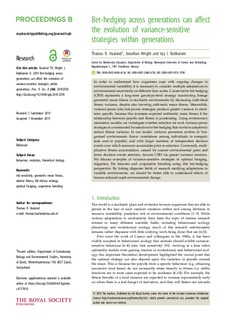| dc.contributor.author | Haaland, Thomas | |
| dc.contributor.author | Wright, Jonathan | |
| dc.contributor.author | Ratikainen, Irja Ida | |
| dc.date.accessioned | 2019-11-29T08:02:45Z | |
| dc.date.available | 2019-11-29T08:02:45Z | |
| dc.date.created | 2019-11-28T09:31:10Z | |
| dc.date.issued | 2019 | |
| dc.identifier.citation | Proceedings of the Royal Society of London. Biological Sciences. 2019, 286 (1916), . | nb_NO |
| dc.identifier.issn | 0962-8452 | |
| dc.identifier.uri | http://hdl.handle.net/11250/2630964 | |
| dc.description.abstract | In order to understand how organisms cope with ongoing changes in environmental variability, it is necessary to consider multiple adaptations to environmental uncertainty on different time scales. Conservative bet-hedging (CBH) represents a long-term genotype-level strategy maximizing lineage geometric mean fitness in stochastic environments by decreasing individual fitness variance, despite also lowering arithmetic mean fitness. Meanwhile, variance-prone (aka risk-prone) strategies produce greater variance in short-term payoffs, because this increases expected arithmetic mean fitness if the relationship between payoffs and fitness is accelerating. Using evolutionary simulation models, we investigate whether selection for such variance-prone strategies is counteracted by selection for bet-hedging that works to adaptively reduce fitness variance. In our model, variance proneness evolves in fine-grained environments (lower correlations among individuals in energetic state and/or payoffs), and with larger numbers of independent decision events over which resources accumulate prior to selection. Conversely, multiplicative fitness accumulation, caused by coarser environmental grain and fewer decision events selection, favours CBH via greater variance aversion. We discuss examples of variance-sensitive strategies in optimal foraging, migration, life histories and cooperative breeding using this bet-hedging perspective. By linking disparate fields of research studying adaptations to variable environments, we should be better able to understand effects of human-induced rapid environmental change. | nb_NO |
| dc.description.abstract | Bet-hedging across generations can affect the evolution of variance-sensitive strategies within generations | nb_NO |
| dc.language.iso | eng | nb_NO |
| dc.publisher | The Royal Society Publishing | nb_NO |
| dc.relation.uri | https://royalsocietypublishing.org/doi/10.1098/rspb.2019.2070 | |
| dc.rights | Navngivelse 4.0 Internasjonal | * |
| dc.rights.uri | http://creativecommons.org/licenses/by/4.0/deed.no | * |
| dc.title | Bet-hedging across generations can affect the evolution of variance-sensitive strategies within generations | nb_NO |
| dc.type | Journal article | nb_NO |
| dc.type | Peer reviewed | nb_NO |
| dc.description.version | publishedVersion | nb_NO |
| dc.source.pagenumber | 10 | nb_NO |
| dc.source.volume | 286 | nb_NO |
| dc.source.journal | Proceedings of the Royal Society of London. Biological Sciences | nb_NO |
| dc.source.issue | 1916 | nb_NO |
| dc.identifier.doi | https://doi.org/10.1098/rspb.2019.2070 | |
| dc.identifier.cristin | 1753513 | |
| dc.relation.project | Norges forskningsråd: 223257 | nb_NO |
| dc.relation.project | Norges forskningsråd: 240008 | nb_NO |
| dc.description.localcode | © 2019 The Authors. Published by the Royal Society under the terms of the Creative Commons Attribution License http://creativecommons.org/licenses/by/4.0/, which permits unrestricted use, provided the original author and source are credited. CC-BY | nb_NO |
| cristin.unitcode | 194,66,10,0 | |
| cristin.unitname | Institutt for biologi | |
| cristin.ispublished | true | |
| cristin.fulltext | original | |
| cristin.qualitycode | 2 | |

